By Ahmet Bushati
Part thirty-seven
Memorie.al/ After the flag was altered in 1944 with the addition of the communist star, Shkodra transformed into a center of resistance against the regime, paying a high price for its tradition of freedom. By April 1945, high school students, already feeling betrayed by the promises of the war, gathered to oppose the new terror that imprisoned and killed innocent people. Communism turned Kosovo into a province of Yugoslavia, while Shkodra was punished for its “historical crime”- its defiance against invaders. The “Postriba Movement” became a tool to suppress all dissent, plunging the city into an unprecedented spiral of suffering: imprisonments, executions, and the destruction of families. The high school students, alongside citizens, became symbols of resistance, while some “young communists” turned into tools of the State Security, leading to expulsions, imprisonments, and internments.
Four times, Shkodra rose in armed rebellion, but history forgot these battles. This book is written to remember the countless prisoners, the tortured, the killed, and the parents who suffered in silence. It is a warning against dictatorship and a plea for future generations not to forget the sacrifices made for freedom.
Continued from the previous issue
In the Footsteps of a Diary
A provocation that depressed me immensely!
I was under the heaviest weight of the pains of “jerm” (the bracket), when one night, a little later, suddenly and with great emotion, I heard that from outside, somewhere below my window, a man was speaking to me in a low voice: “Ahmet, Ahmet!”, which at once made me forget the pains of everything, and listen to that call, which would be repeated another time, and then I, looking out of the window above, – which that night seemed higher than ever – I tried twice to climb up there, and both times, due to a complete lack of strength, I failed again, almost without starting. I had no strength left at all.
After some time, that man from outside, – as if to avoid the police’s ears – calls me again in a low voice: “Ahmet, Ahmet”! and I finally became convinced that the person calling was a provocateur, perhaps Ferit Mandia himself who worked in the Security, or another person, – in any case, they were introduced by him – who wanted to take advantage of the opportunity, when many of us arrested in those last days, among whom were also students, had filled the dungeons and the corridor inside, as well as outside, right up to our windows, where they were kept tied up and covered with blankets, as we have shown another time. The provocateur, to make me more trustworthy, would add at that time, as if in surprise: “Ahmet, how much you have changed, man! I am Bardhoshi, Bardhoshi. Simja is here too”!
Although I was certain that he was not Bardhoshi, – but not certain that Sima had not been arrested, – the fact that Bardhoshi’s name was mentioned by a Sigurimi officer indicated that his group had finally been discovered and that Sima’s name was among the first to be arrested. Forgetting everything else, it seemed to me that for the first time something great had suddenly collapsed inside me and that in the most miserable way that thing for which I had until then believed was worth suffering and dying had been destroyed.
Despite the deepest regret that I was experiencing at that time, the exposure of the group; “Albanian Effort”, led by Bardhoshi, did not surprise me, considering the courage and enthusiasm of those young students and above all their naivety. I would remember on that occasion how I had told Bardhoshi at that time; “not to write slogans on the walls of the gymnasium”, how premature the act was, which in itself carried the risk of the group being discovered, and I would also remember with pain his last words: “I had no choice, Ahmet, my comrades did not listen to me and gave up the action for which they were prepared”!
I fell into thought and surprisingly, for the first time I believed that death was not the thing that would surely save me from suffering and shame, and that the truth of my sacrifice might never be known. The suspicion that on the night I died, the Sigurimi, – as always, in such cases – would empty an automatic barrage and, the next day, spread the news that; “he was killed by a guard while trying to escape from prison” and, to serve my fellow prisoners with a statement supposedly signed by me, forged by the Sigurimi itself, was like a nail in my brain.
“But my suffering, will it be in vain”?! – I said to myself: “And what will my friends say about me then? Bardhosh Dani, two years younger than me, who had trusted me so much, what will he say in that case? And Simja, to whom I was ready to justify with any sacrifice any image she had built for me, what would she say in a case like this? And the other students, whom we claimed to have led in the fight against communism? And Shkodra itself, for whose good opinion my father had agreed to sacrifice me, what would she say”?!
Eight months in the Security, and such a bad thought, as this one, which was rapidly plunging me into the deepest despair, I had never experienced in my life. Thought after thought, each one blacker than the other, gathered together within me, until finally, unable to hold back any longer, I burst into tears for the first time. The idea that the Security, by speculating on my death, would cause the shadow of shame to forever follow my name before the world and that I would leave the house in pain and without pride, caused despair to fall upon me with the weight of a real horror.
Tears after tears, I was seized with trembling, and with them, a slight groan, which I tried to hold back so as not to be heard outside, but without success, because at this very moment the light suddenly turned on from outside, and to my great shame, in the small square of the counter, appeared the face of Qemali, the good policeman, whom I had not seen since the winter, and precisely since that time when Sirri Çarçani had declared that measures would be taken against him for the hands that he had somehow freed from the handcuffs. Qemali, yellow in the face and with tearful eyes, asked me with all his pain: “What have you done, brother?! What have you done, brother?” I, unfortunately, was taken by surprise by him, unable to quickly stop the tears and unable to get, of course, a single word out of my mouth. I was so ashamed!
Touched by my situation, even though he had not received a response from me, Qemali slammed the door shut and left in great anger for another dungeon, to a prisoner who was thought to be related to me and where Qemali had thought of venting his anger, but without thinking that even at that hour of the night, Ismail Lulo could happen to be listening behind the wall of our prison, eavesdropping on the prisoners, as well as his police comrades, who would then enter the prison corridor, addressing Qemali with the words: “Qemali in the bullet, in the bullet”!
Apparently, for this reason, Qemali was finally sent away from there, never to be seen again, except once after two years from afar, when he was part of the group of policemen who were escorting our motorcade back to the Peqin camp. I would calm down somewhere after a few hours, as a result of a new idea that flashed in my head and that I would realize the next morning, when I returned from the W.C. And so it happened: naked as I was, with my hands and knees on the ground, but wrapped in a white mattress sheet, which they had given me for that occasion, I went and returned from the W.C. I stopped in front of the door of my dungeon, glancing at the end of the corridor.
I didn’t know who the prisoners were there, however, I don’t know why I believed that at least Ruzhdi Rroji was somewhere at the end of that corridor, and perhaps in dungeon no. 9, from which he could see me. Directing his gaze in that direction, I called out with difficulty, but loudly: “I am Ahmet Bushati, if I die, please show that I have not committed a crime” and, raising my right hand high, as a sign of encouragement to the prisoners around the dungeons, I called out again: “Stay, stay”!
Luckily for me, Mënyri had been on duty that day, so that as if nothing had happened, even in that case he would have spoken to me gently: “Come in, come in”. Towards the end of September they changed my dungeon, taking me to the one with no. 12, towards the darkness. It is unbelievable that Ali Xhunga, despite my hanging and my very deteriorating condition, would find the opportunity to lay me on the wood one day, even though my body was covered in wounds. He had me upside down with my body and face on the floor, and with a short, thick stick, he would hit me hard.
Since he was hitting me several times in one place on my naked body, I would be in so much pain that if I avoided hitting a certain point even once, I would have given that executioner a body part with wounds. It was my fate that at that moment, by coincidence or as if by agreement, Lilo Zeneli entered, and apparently, at his signal, the brave Ali Xhunga stopped the blows on the spot.
For most of the time until the end of October, I would not know whether I had ever closed my eyes or not; whether they had given me something to eat; whether they had taken me out to the W.C. or not; whether I had ever fainted again. My “neighbors” in the dungeon, such as the former investigator Pjerin Kçira or the student Mikel Muzhani, would also tell me about other episodes related to me, which would certainly be of even greater value to this book, but which I, due to the unconscious state that I have had many times, do not remember, and of course I do not write about, as I consider them outside my experience.
However, I only remember that during all that time I would remain, I would remain with my eyes closed, that I would constantly sleep, and that I would perhaps have consciousness especially in cases when Ali Xhunga would put me in the dungeon. So when I finally one day saw myself with clothes on my body, I would wonder who had put them on me and when. But let’s see until then, because there is more.
For the last time, boss Lilo Zeneli advises me!
When Lilo Zeneli called me to his office, it was night and only three or four days had passed since he had intervened to get Ali Xhunga to stop the beatings on my body. With the help of two policemen who held me by the arms, and who, from the severity of my wounds, walked with their heads to the side and spat on the ground from time to time, I barely crossed the courtyard in the middle of the Dega prison, which seemed longer than ever, while those policemen would lift my weight up the stairs.
They took me into Chief Lilo’s office in a state in which I could not stand at all. With a beard that had not been shaved for two months, dressed in dirty and wrinkled trousers – as if abandoned by the body that had been hanging while I was hanging – and held by a string around my waist, without socks or shoes on my feet, they blindly sat me down on a bench on the right side of the office, very close to the door. In front of me and very close, Chief Lilo.
I couldn’t open my eyes when I entered that office, nor when I sat down on the bench, and I wouldn’t be able to open them even when boss Lilo insisted on it several times, and never. Because of the bright light in the office, I couldn’t open my eyes, and since I couldn’t breathe, I couldn’t even speak, and I couldn’t even close my mouth for a single moment, so that I could take a little breath in. I could only listen with my ears, at least with one.
Lilo was speaking to me softly, advising me to give up that resistance, which, according to him, made no sense, since Sigurimi knew everything in time. He was telling me that I was dying young and that I was unnecessarily leaving behind a house full of women, etc. etc. With a mirror in his hand in front of my face, he would stand for a long time, insisting that I open my eyes just once, in order to see my condition at its worst, something I was physically unable to do, despite all the great effort I was making, to at least get rid of Lilon, who had become so unbearable to me with his insistence. He did not understand that he was asking the impossible of me. I was in such a state that not only could I not open my eyes and speak, but I could not even listen, because even the words of the other person would be torture for me, for the torment they would inflict on me.
Finally, Lilo, seeing that he was not convincing me to open my eyes even once to see myself as I was, even angrier, put the barrel of a revolver in my mouth and started shouting those big words of his, which not only tormented me a lot, but also, as I had seen, sounded like child’s play to me. But how could I expect him to take it seriously! I could not speak, but my mind was in the right place. I raised my two bound hands to remove the revolver from his mouth, so that I could shout at him: “You are no longer the man we thought you were, because if you were not like that, you would not be able to do what a man should do to a person in this condition”!
I tried several times to get him to say a few words, but I couldn’t articulate a single syllable, which made me suffer even more! After this last attempt of his that I had to forcefully open my eyes, it seems that he finally realized my physical impossibility and didn’t continue, so much so that when the policemen were taking me down the stairs, he dueled one of them at the door, to whom he apparently told them not to take me to the dungeon, – by which he meant the other prisoners who would one day testify to my death – but to take me down to a dark basement, where I could die without anyone seeing or hearing me.
Lilo Zeneli, perhaps as a human being, called me to avoid my death, and when he saw that he was not succeeding, then as head of the Sigurimi, he would think of erasing its traces, isolating me in a completely unusable basement, with which, after my death, he could make credible any alibi that the Sigurimi would need.
About a week in the basement!
So that night, as if following the order they received, the police opened a door under the stairs, led me down through the darkness and up another flight of stairs, and finally abandoned me in the darkness of a pool where absolutely nothing could be seen. When I lay down to sleep there – since they didn’t hang me – I realized that the bed was made of fresh earth, where I had my first real sleep after two months of being hanged and I would wake up the next day at lunchtime, when the policeman with a piece of bread in one hand and the rope in the other, would wake me up, when I would see for the first time where I was. After I had eaten a few bites of dry bread, the policeman hung me loosely to one of the wooden beams that held the plank floor above.
The basement was an ordinary barn of our houses, large and no more than two meters high, into which very little light entered from two small rectangular holes that came above the boards at the level of the yard outside. The environment there was fresh and smelled of a heavy smell of damp earth, and seemed to be red in color. Above all, I was impressed by the presence of many rats and their size, perhaps black holes. I had never seen rats so large and moving around so freely as there!
So large and powerful, but also so cunning were those rats, that it happened that my ration of bread, in a fight with one another, would be immediately devoured. If the policeman, through carelessness – before freeing me from the gallows at lunchtime – had left the bread not near the place where I would more or less sit down – it happened that by the time I crawled to reach that piece of bread, the agile rats would have devoured me by then. It happened that, taking advantage of my delay; they would have pulled the piece of bread from my eyes and not far from my hands extended towards it.
I usually ate very little of the bread that the policeman brought me at lunchtime, and I threw most of it as far away as I could. On such an occasion, a real spectacle would unfold before my eyes: the rats, without wanting to know about my presence, would wage a real battle around that piece of bread, which would not last more than a few minutes, a battle that I was forced to follow unwillingly and, of course, reluctantly.
During those few days of my stay in that basement, the policeman assigned to deal with me, uncontrollable as he was, would often, after bringing me the bread untied from the hanger, come late to re-hang me, thus creating the opportunity for me to sleep longer than the interrogator allowed. The relatively loose hanging, the coolness of the basement, and the little sleep I got laying on the floor at every lunchtime, allowed me not only to escape death for once, but also to regain some of my completely exhausted strength.
That layer of boards, which served as the floor for the upper floor and as my ceiling, stood as a line of demarcation that sharply divided two opposing worlds between them: above, the stairs that led down to the basement, free people and diligent servants of the dictatorship, with the fate of which they had linked their lives and all their hopes, while below, I, the prisoner, a determined opponent of their power, who, despite being young, was praying day and night for death.
In that office above me, worked the plainclothes investigator who had tortured Muhamet Spahina to death a few months earlier. Since I was constantly crying from the pain of my wounds and the shortness of breath – as a physical need of the body that was – it would happen that on one of those first nights that gentleman would shout several times from above and beat his feet on the floor, telling me; “Stop, stop, they won’t let us work”! Enraged by my answers, he would then approach the locked door of the basement and kick it with his feet, but I didn’t even think about it.
No matter how much they hung me for days, as I said above, I was gradually getting used to it there and, at the same time, I would sometimes unintentionally overhear conversations that took place upstairs. A girl named Shpresa would often be in that office. There were times when they would even talk about work and love. I remember once, when Shpresa was asked – who I think was engaged at the time – when love should be sweetest, she replied: “When you are in love and you wait to announce your engagement.” Memorie.al




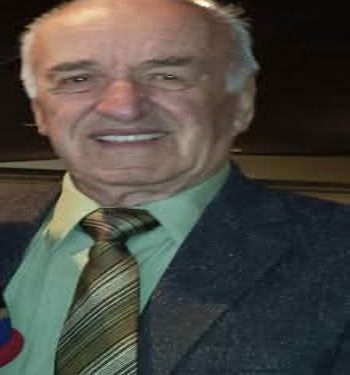
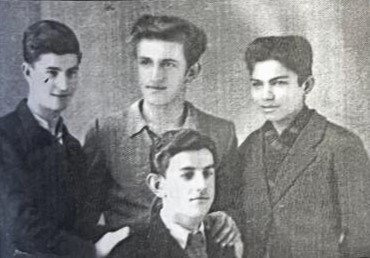
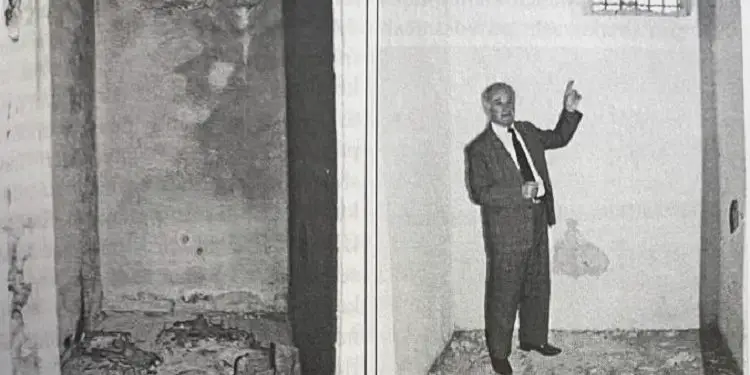
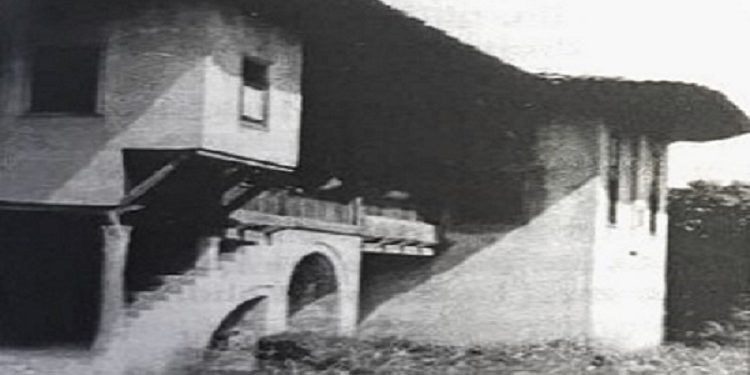
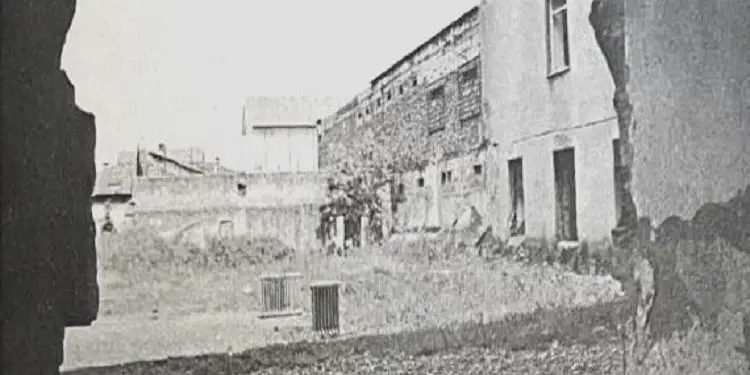
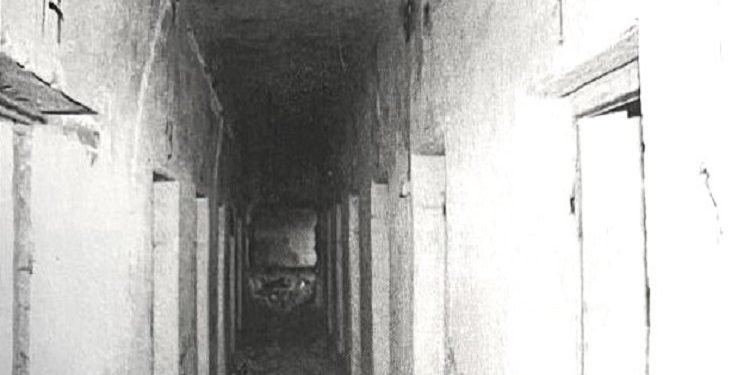
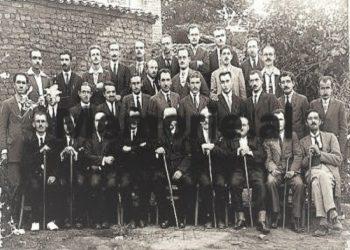

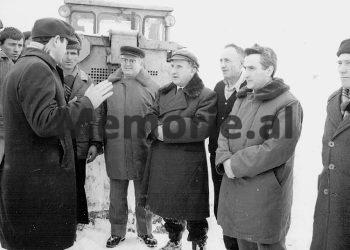
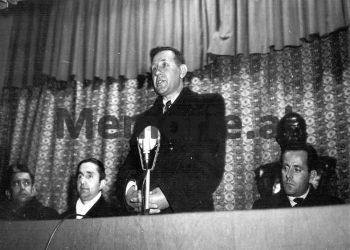
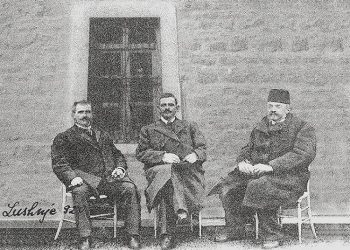
![“Light imprisonment may be served in a workhouse or by performing labor for public benefit; and if the convict does not display [bad behavior/resistance]…” / What did the Penal Code of 1928 provide?](https://memorie.al/wp-content/uploads/2025/03/admin-ajax-1-350x250.jpg)
